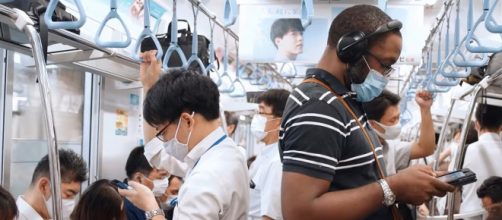A documentary by a husband-and-wife team of photographers offers a look at how African Americans living in Japan compare racism in that country and in the United States. The 15-minute film "Living while Black in Japan" was uploaded to NPR's YouTube channel on September 15.
Keith Bedford, an African American, and his wife, Shiho Fukada, a native Japanese, discussed their film during an episode of NPR's "The Picture Show." The couple explained that in the summer of 2020 they had been thinking of returning to the U.S. from Japan, then came news of the killing of George Floyd.
NPR said that watching a video of Floyd's death had given the couple the idea of making the film. The documentary shows six African Americans -- three men and three women -- comparing their treatment in Japan to the treatment Black people can expect in the U.S.
'A great mini-documentary'
Professor Tomonori Nagano, of LaGuardia Community College, recommended the film as "a great mini-documentary" on his blog at the school's Japanese Studies Department. Nagano noted that just as the film described Jones being made to feel like an "outsider" in Japan and it depicted his wife having similar experiences in the U.S.
'I can do things in Japan that I can’t in the U.S.'
The news site NextShark pointed out that the interviewees had been more comfortable in Japan than in the U.S.
The site recalled one woman saying, "I can do things here in Japan that I can’t do... in the U.S." NextShark also recalled one man stating that in the U.S. he had been regarded as “less of a person, more of a threat.”
Other views of racism in the US and Japan
The documentary is not the first time the American media has contrasted the experiences of Black Americans in Japan and the U.S.
Writing in the Charlotte Observer, Tracy Jones reflected on his experiences as an African American returning from Tokyo to Charlotte, North Carolina. His October 16, 2020 article is titled “A Black American returns home from Japan, then finds culture shock in Charlotte.” He recalled that “the American media machine” had infected most Japanese people with negative stereotypes about African Americans.
Recounting his nine years in Tokyo, Jones said, “Upholding their civility, they’d closely watch me and keep their distance to elude embarrassment.” Jones recalled that he and his Japanese wife had not encountered the same civility after settling in the U.S. He added that seeing Black Lives Matter protesters taking to the streets had “inspired hope.”
In a New York Times interview, Baye McNeil said that Japanese people often avoided sitting next to foreigners in public places. He said, "the empty-seat phenomenon permeates virtually every aspect of the conspicuous non-Japanese person’s life." McNeil noted that Japan had provided him with a "safe space" to examine and discuss racism. "Before going there, there was no truly safe space in the U.S.," he said. The interview was published on March 9, 2019 under the title "What It’s Like to Be a Black Man in Japan."


